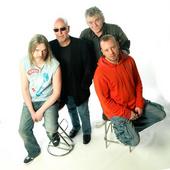In the early 1960’s there were many fledgling Scottish bands struggling to create a unique sound of their own. A major factor holding them back was their remoteness from the main hub of the UK music business. London was where you had to be and frankly nobody was interested in what was happening north of Watford let alone in Scotland ,
Matters were made even worse by Scottish promoters and ballroom managers who insisted that Scottish groups limit their set-list strictly to covers of singles in the UK top thirty. In other words,
performers like Agnew, Charlton, singer and front man Dan McCafferty, and drummer Darrell Sweet were excluded by 'the machine in London', and yet trapped into mimicking its often dire output as well.
Several things marked these guys out as a bit different: first, they were married and settled before they decided to take the plunge – in the summer of 1971 - quitting good day-jobs and moving away from home to a grotty communal flat in London; second, they grew up and lived in a conservative-attitudes Scottish town, not a bustling fashion-conscious metropolis like Glasgow. Lastly, in bingo millionaire Bill Fehilly, they had what no other struggling Scottish band had at the time - solid financial backing.
The band’s extensive gig schedule brought them to the attention of Pegasus Records, who released the bands debut album in late 1971. Featuring a cover of Tim Rose’s ‘Morning Dew’, ‘Nazareth’ caught on in Germany but wasn’t as successful at home. For the following year’s ‘Exercises’ album, Roy Thomas Baker (who would later work with Queen, Alice Cooper and Foreigner among many others) was promoted from engineer to producer. An early version of ‘Woke Up This Morning’ – a song that Nazareth revived for their next album – and the highland fling of ‘1692 (Glencoe Massacre)’ were the highlights of ‘Exercises’, but more than three decades later, the pair agree that it sounds lightweight and directionless.
Britain in 1973 most definitely was the year of Nazareth, a year
when Melody Maker readers voted them Brightest Hope. But if you look at
the UK chart placing of follow-up albums to Razamanaz – which reached
number 11 – from 1974 what looks like a gradual decline here is more than
offset by a series of breakthroughs on the international scene. Whereas
Loud'N'Proud reached number 10, Rampant charted with sales nowhere near as
strong, and album six Hair Of The Dog failed to chart in Britain but
notched up massive sales world-wide.
Full history of Nazareth can be found on the official website website at
www.nazarethdirect.co.uk
